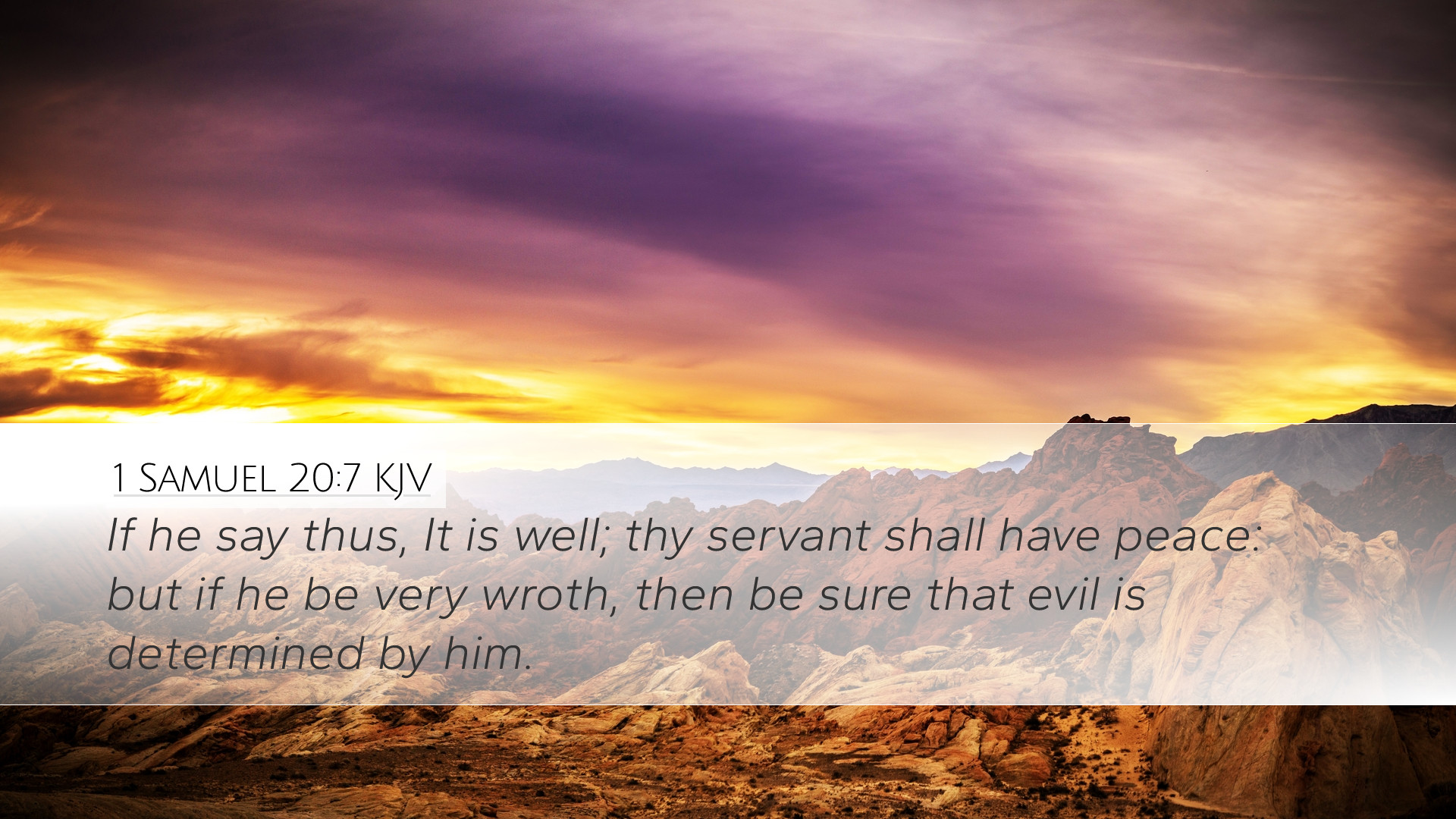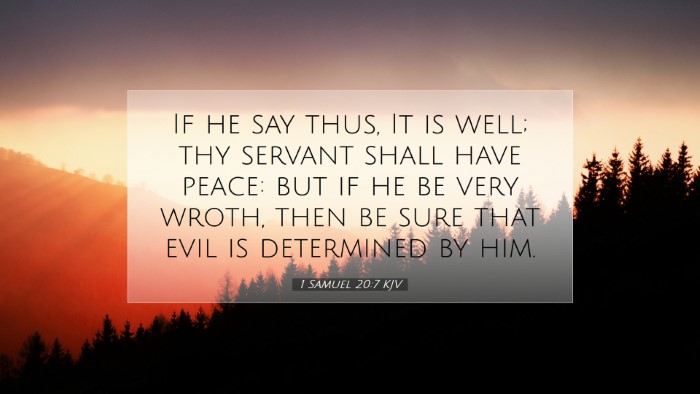Commentary on 1 Samuel 20:7
Verse: "If he say thus, It is well; thy servant shall have peace: but if he be very wroth, then be sure that evil is determined by him."
Introduction
This verse captures a critical moment in the life of David as he navigates the complexities of his relationship with King Saul. The context emphasizes the tension and the necessity for prudence and discernment in David’s dealings with the king. This commentary aims to distill insights from public domain sources, aiding pastors, students, theologians, and Bible scholars in their understanding of this text.
Contextual Background
The backdrop of 1 Samuel 20 unfolds a narrative rich in intrigue, loyalty, and the subtle dynamics of power. At this stage, Saul's jealousy of David has escalated to a point where David's life is in imminent danger. The discourse between Jonathan and David not only reveals personal loyalties but serves as a microcosm of Israel's broader political tumult.
Matthew Henry remarks on the “tragedy of Saul,” emphasizing that the king’s growing wrath is not just a personal failing but also indicative of his spiritual condition. This context enriches our understanding of Jonathan's role as a mediator.
Analysis of Key Phrases
- “If he say thus, It is well”: This initial criterion suggests a façade of peace that Saul might present. Jonathan is instructed to discern Saul's true feelings through his words, a reminder of the importance of wisdom and understanding in communication. Albert Barnes notes that this reflects the necessity of testing the spirits and not taking outward appearances at face value.
- “Thy servant shall have peace”: The concept of peace here is profound. It signifies not just the absence of conflict but also a state of goodwill and a maintained relationship. Adam Clarke highlights that this peace is conditional and reflects David's desire to live harmoniously with Saul, showing his respect for the king despite the dangers involved.
- “But if he be very wroth”: Here, the intensity of Saul's emotion is marked. Henry explains that such wrath signifies more than anger; it embodies a deeper rage fueled by jealousy and insecurity. This anger can be understood both in personal and historical contexts, where the anointed king feels threatened by a divinely chosen successor.
- “Then be sure that evil is determined by him”: Jonathan's awareness of Saul's disposition leads to a stark conclusion about the potential for violence. This insight is not merely a prediction; it serves as a prophetic warning. Barnes interprets this as a clear recognition of the corrupted heart of Saul, indicating that David must be vigilant and cautious.
Theological Implications
1 Samuel 20:7 forces readers to confront the darker elements of human emotion and conflict. The wrath reflected in Saul serves as a reminder of the destructive power of jealousy and fear. Clarke suggests that this verse brings forth a sobering truth regarding how seemingly benign moments can be deceptive and how underlying tension must be discerned through spiritual insight.
This narrative also emphasizes the theme of the divine plan for leadership. The knowledge of Saul’s wrath and intent reinforces the idea that God orchestrates events and relationships, underpinning every action taken by both Saul and David. It is a vivid reminder of God’s sovereignty amidst human actions.
Practical Application for Modern Believers
For contemporary believers, this passage serves as wisdom for personal relationships and community dynamics. Here, we find valuable lessons in understanding human emotion and motivations. Pastors, in particular, may glean from the need for discernment in ministry, recognizing that not all who appear well-meaning may be so at heart.
Key Takeaways:
- The importance of discernment: Like Jonathan, we are called to understand the deeper realities behind words and actions.
- Awareness of emotional undercurrents: Recognizing that personal and communal relationships can be influenced by forces similar to those affecting Saul.
- Maintaining peace: The pursuit of peace should be at the forefront of our relationships, mirroring David's heart despite facing hostility.
Conclusion
1 Samuel 20:7 is a powerful verse that encapsulates themes of loyalty, danger, and divine providence amid human emotion. The insights drawn from Matthew Henry, Albert Barnes, and Adam Clarke illuminate the nuances of this text, providing a rich landscape for theological reflection and personal application. In the tensions of our relationships, may we seek the wisdom of Jonathan and the heart of David, aiming always for peace while remaining vigilant against the lurking dangers of anger and jealousy.


